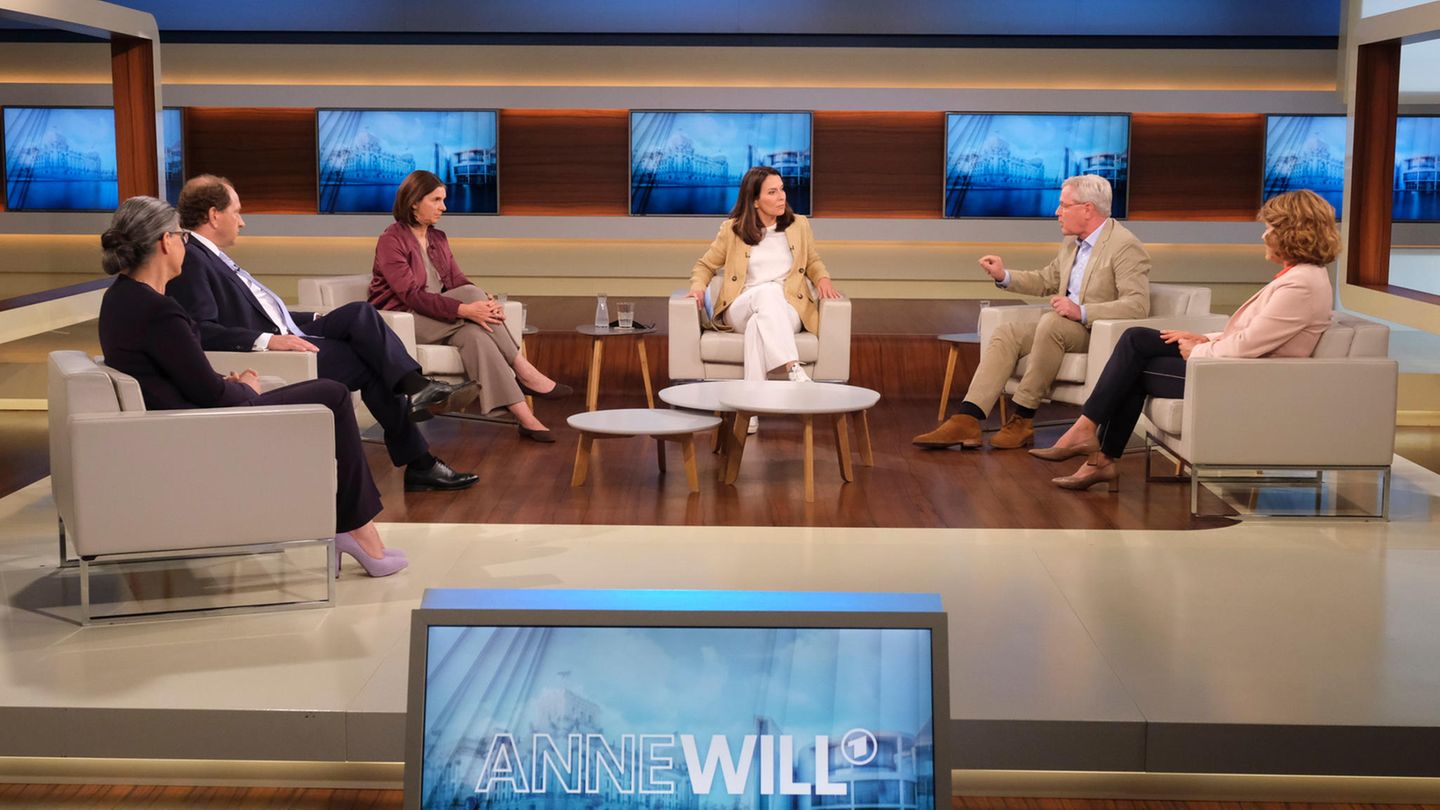TV debate
Before Anne Will’s summer break, the CDU, SPD, Greens and FDP talk more about anything to do with energy than they do with each other. Above all, it is clear what is not possible – and that is quite a lot.
Gas is now flowing through the Nord Stream 1 pipeline again, but nobody really trusts it. And all the important questions are still open: “Still dependent on Putin’s gas – how will Germany manage the energy transition?” so the question is with Anne Will tonight. Chancellor Olaf Scholz has just promised us that “no one will be left alone” with all the problems and, above all, all the costs that all of this will cause. If he doesn’t promise too much. Or?
Who discussed?
- Katrin Goering-Eckardt (Bündnis 90/Die Grünen), Vice President of the Bundestag
- Nina Scheer (SPD), energy and climate policy spokeswoman for the parliamentary group
- Alexander Graf Lambsdorff (FDP), deputy parliamentary group leader in the Bundestag
- Norbert Rottgen (CDU), member of the Foreign Affairs Committee of the German Bundestag
- Petra Pinzlercorrespondent in the capital city office “Die Zeit”
How did the discussion go?
Everyone is talking at once that evening, constantly, with the men in the group first and foremost, of course. Until you finally feel the end of the show and with it the end of all the mutual finger pointing as salvation. It should have been one more man, but Katrin Göring-Eckardt, as Green Bundestag Vice President, now has to replace the Economics Minister, who would have preferred to be heard on the issue of the program. Is this still coalition negotiations or is it already desperation? Or is it just because now, in times of the ongoing war in Ukraine, all party identity issues are on the table at the same time? Lifetime extensions for nuclear power plants, speed limits, nationalization of companies, taxes, the car, the debt brake, the commuter allowance, basic security and so on. You already know.
It’s actually about the energy transition, of course, and the question of how we can best become independent of Russian gas, which President Vladimir Putin is now using as a means of power and blackmail against Europe. At this point, Nina Scheer from the SPD first evokes the “massive saving” (i.e.: of energy) as a “collective act”, and one almost thinks she wanted to say patriotic or peacemaking. Like her chancellor, she promises “further relief measures” without being any specific.
The temporary and expiring measures such as the nine-euro ticket and the tank discount will not be, says FDP man Alexander Graf Lambsdorff, that much is clear, and the Greens politician also says that the state is not subsidizing against the crisis could. Of course, Lambsdorff says that several times.
Göring-Eckardt dreams of an unspecified “connection solution” for cheaper local transport and wants to introduce a kerosene tax for it. At first she strictly rejected longer running times for nuclear reactors that are still in operation – only to later say that this could be discussed as an “emergency supply”. But only if the indoor pools have been closed beforehand and the hospitals “can no longer work”. Then you have to talk, she thinks. She also questions the guilt brake in order to “orientate herself towards reality”. But the FDP insists on it, but so did the Greens in the past.
The three traffic light politicians on the one hand and the oppositionist Norbert Röttgen (CDU) on the other hand spend a good part of the program blaming each other and at the same time. Some constantly emphasize what the Merkel government has failed to do (e.g. the expansion of renewable energies), while others constantly say that nothing has happened since the war broke out, thereby reliably driving the other side to incandescence. “There is no austerity strategy,” Röttgen complains, noting that half a year has been wasted while the government has become self-inflicted dependent on Russia. “We’ve got a lot going,” says Nina Scheer. And Herr Lambsdorff thinks so too, while naming a few laws with long names that hardly anyone out there knows.
The special moment
It gets bizarre when FDP man Lambsdorff dismisses a speed limit as “irrelevant” and as a “mini topic”. Although he outed himself as a fan of the nine-euro ticket, he was even more of a fan of driving fast on the freeways. Will asks whether it could be that the FDP acts as a party for SUV and Porsche drivers: “No, that can’t be.” Can it be that he doesn’t care about climate policy arguments? Yes, yes; but no one asks him that. Norbert Röttgen then jumps in with the FDPler, although he sees “strong factual arguments” for a speed limit. Somehow he’s against it, for party reasons or something, or because he prefers to do foreign policy with pithy words. His justification: “That doesn’t do justice to the dimension!”
The findings
Three nuclear reactors are still running in Germany, together they are responsible for six percent of German electricity production. It’s different in France, but there many nuclear power plants fail because they can’t be properly cooled: the rivers don’t have enough water. By 2030, however, 80 percent of the electricity in this country should come from renewable energies.
Conclusion
After this cacophony, we really deserve a summer break from Anne Will.
Source: Stern
David William is a talented author who has made a name for himself in the world of writing. He is a professional author who writes on a wide range of topics, from general interest to opinion news. David is currently working as a writer at 24 hours worlds where he brings his unique perspective and in-depth research to his articles, making them both informative and engaging.




